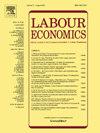Television and family demography: Evidence from a natural experiment in East Germany
IF 2.2
2区 经济学
Q2 ECONOMICS
引用次数: 0
Abstract
This paper examines the causal effects of television exposure on individual decisions regarding marriage, divorce, and family planning by utilizing a natural experiment in the German Democratic Republic during the period of German division. I exploit the fact that individuals in some East German areas could not receive Western television due to their place of residence before reunification in 1990. By analyzing survey data from the German Socio-Economic Panel, my results reveal that exposure to Western TV significantly reduced the likelihood of marriage and childbirth while increasing the probability of divorce among East Germans. Analyzing administrative data at the county level supports these findings. In addition, survey data from the late 1980s indicates that the observed effects are primarily due to changes in attitudes towards relationships and family life, particularly among women.
电视与家庭人口:来自东德自然实验的证据
本文利用德国分裂时期德意志民主共和国的一个自然实验,研究了电视接触对个人结婚、离婚和计划生育决定的因果影响。在 1990 年德国统一之前,一些东德地区的居民由于居住地的原因无法收看西方电视,我利用了这一事实。通过分析德国社会经济小组的调查数据,我的结果显示,接触西方电视显著降低了东德人结婚和生育的可能性,同时增加了离婚的可能性。分析县一级的行政数据也支持这些发现。此外,20 世纪 80 年代末的调查数据表明,观察到的影响主要是由于人们对人际关系和家庭生活的态度发生了变化,尤其是女性。
本文章由计算机程序翻译,如有差异,请以英文原文为准。
求助全文
约1分钟内获得全文
求助全文
来源期刊

Labour Economics
ECONOMICS-
CiteScore
3.60
自引率
8.30%
发文量
142
期刊介绍:
Labour Economics is devoted to publishing research in the field of labour economics both on the microeconomic and on the macroeconomic level, in a balanced mix of theory, empirical testing and policy applications. It gives due recognition to analysis and explanation of institutional arrangements of national labour markets and the impact of these institutions on labour market outcomes.
 求助内容:
求助内容: 应助结果提醒方式:
应助结果提醒方式:


